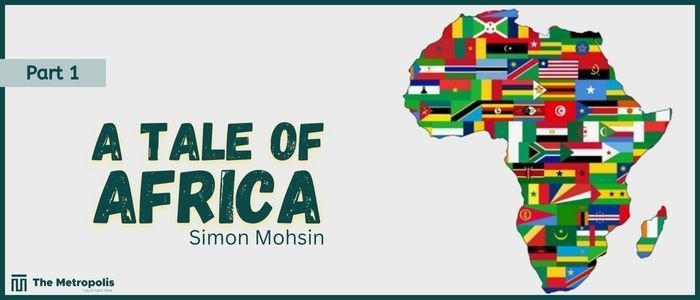Simon Mohsin-
Africa is increasingly at the center of global politics and academic debates. It had been long considered peripheral to both international affairs and the discipline of international relations, but now Africa has emerged as an increasingly powerful and confident actor on the world stage. While global powers continue competing for economic, political, and strategic influence on the continent, the African nations are standing up on their own, for their own, mainly due to the leadership of the African Union (AU). The AU has embarked on an ambitious agenda inspired by Pan-Africanism, seeking to create an Africa that is a “Strong, United, and Influential Global Player,” as stipulated by several scholars.
Pangs of Colonialism
When French President Macron visited Africa last year, the African nations had already begun to overtly display to the West, mainly the French that Africans are disgruntled with the unfair treatment they had been getting from the global powers. Macron’s five-day trip to Africa, visiting Gabon, the Democratic Republic of the Congo, the Republic of the Congo, and Angola excluded several countries in the Sahel region, including Burkina Faso, Mali, and Niger, where there is significant tension with France. African political analyst Amir Nourdine Elbachir pointed out that Western nations regularly discussed plans for Africa without involving Africans. The sentiment was evident when in a press conference during the visit, the President of the Democratic Republic of the Congo Félix Tshisekedi underscored that Macron treats African nations as equal partners. The Scramble for Africa also known as the Rape of Africa was the invasion, annexation, division, and colonization of most of Africa by seven Western European powers during an era known as “New Imperialism” (between 1833 and 1914). The 10% of Africa that was under formal European control in 1870 increased to almost 90% by 1914, with only Liberia and Ethiopia remaining independent. Most of Africa was decolonized during the Cold War period. However, the old imperial boundaries and economic systems imposed by the Scramble still affect the politics and economy of African countries. Tsenay Serequeberhan explicated this as neocolonialism which allowed Europe to propagate policy of socio-economic and political dominance in post-colonial Africa. For Serequeberhan, neocolonialism in Africa is just a replication in a disguised manner of what was carried out during the colonial period.
Economic seizure
The 14 African States declared independence from France, these are Benin, Burkina Faso, Senegal, Cote d’Ivoire, Mali, Niger, Togo, Cameroon, Central African Republic, Guinea Bissau, Equatorial Guinea, Chad, Congo-Brazaville, and Gabon. When those states declared independence from France, the French government put all the former colonies in a group called ‘compulsory solidarities.’ Those independent states would need to pay 65% of foreign currency reserves to the French treasury and 20% to their financial liabilities. So, each colony has only 15% left to use from their own money.
The tremendous advantages offered to France and the strict terms and conditions of the CFA Franc explain why the currency is referred to as a tool of “monetary servitude”, the “invisible tool of Francafrique” (about France’s neocolonialism in Africa) or, in an absolute plain term, the “colonial currency”. The CFA Franc offers France’s guarantee of convertibility, fixed parities (then with the French Franc, today with the euro), free transferability, and the centralization of foreign exchange reserves. In return, the issuance and printing of money are done in France, and the countries using the CFA Franc are obliged to deposit at least 50% of their foreign exchange reserves at the French Public Treasury.
From the creation of the CFA Franc, nothing was spared to maintain it. Rejection of the CFA Franc and the idea to give up full monetary sovereignty to France is as old as the currency itself, be it by Burkina Faso’s Thomas Sankara or Mali’s Modibo Keita, both of whom were assassinated and overthrown and replaced by strongmen aligned with France. In signs that reforming let alone abandoning it is a taboo, the International Organisation of La Francophonie sacked its Director, the Togolese Economist and former Minister Kako Nubukpo, for his anti-CFA Franc positions.
Military presence in Africa
For decades, Africa has been teeming with foreign military personnel, with more than a dozen countries known to have deployments and bases on the continent. A key area of interest for foreign powers, particularly Western countries, has been the Horn of Africa. At least 13 countries have a military presence in Africa, while there were about 11 foreign military bases in the Horn of Africa, according to a 2019 report by the Institute of Security Studies, a think tank headquartered in South Africa. The US and its allies such as France, the UK, Germany, Italy, Belgium, Japan, and India make up a large chunk of the countries with a military presence on the continent. Among Horn of Africa nations, none has garnered more attention from world powers than Djibouti, which hosts at least eight foreign military bases, including the US, France, Japan, and China. The primary reason is Djibouti’s location at the southern entrance to the Red Sea, acting as a bridge between Africa and the Middle East.
Coups, Conflicts, and Cooperation
Africa is often portrayed as a continent ravaged by war, terrorism, poverty, and political instability. However, over the past five decades, few violent conflicts have occurred between states. In Europe, for comparison, there have been more than 25 inter-state conflicts since 1945. Africa has indeed seen 214 coups, the most of any region; 106 have been successful. Out of 54 countries on the African continent, 45 have had at least one coup attempt since 1950. West Africa, a region of 16 independent states, has experienced 53 successful and 40 failed coups since 1950. There are also cross-border security challenges such as terrorism, banditry, piracy, and the wide presence of arms. But, since independence in the late 1950s, the region’s countries have not gone to war with one another – except for a minor armed confrontation between Burkina Faso and Mali in 1985. Pan-Africanism has been a key determinant of non-aggression and peaceful settlement of disputes defined the relationships between West African countries. The 15 states under the umbrella of the Economic Community of West African States (ECOWAS) positively identify with the fate of others in the bloc. The regional body was formed in 1975 by West African countries seeking to promote economic development. The systemic cooperation between states in the region has led to a collective identity forming over time. A sense of community has developed. The community has developed conflict management mechanisms. This has prevented members from going to war.
In the last 2-3 years, military coups in the Sahel present similarities and differences compared to those that occurred in the 70s-80s. The Sahel is a semi-arid region on the edge of the Sahara Desert that stretches from the Atlantic Ocean in the west and to the Red Sea in the east. The Sahel region suffers from several complex factors resulting from French political and economic domination designed to exploit the region’s vast natural and human resources while subordinating the region’s sovereignty to France.
The coup in Niger follows the pattern of recent takeovers in Mali, Burkina Faso, and Chad. All are former French colonies who replaced neo-colonial regimes with military juntas. Some of these juntas have strong anti-imperialist sentiments and strong nationalist foundations.
Mali, Burkina Faso, and Niger have signed a mutual defense pact, as the three Sahel countries aim to help each other against possible threats of armed rebellion or external aggression. The charter, known as the Alliance of Sahel States, binds the signatories to assist one another – including militarily – in the event of an attack on any one of them. All three states were members of the France-supported G5 Sahel alliance joint force with Chad and Mauritania, launched in 2017 to tackle armed groups linked to al-Qaeda and ISIL (ISIS) groups. The West African regional bloc ECOWAS had threatened to intervene militarily in Niger over the coup, but the regional bloc has toned down its war rhetoric in later days, resulting in the rhetoric becoming a likely non-issue. Mostly because Mali and Burkina Faso quickly responded by saying that any such operation would be deemed a “declaration of war” against them.
French disconnection
Former French colonies in Africa are swiftly becoming known for their frequent military coups. Gabon has become the latest French-speaking African country where the army has seized control, following Niger, Guinea, Burkina Faso, Mali, and Chad. Following the announcement of the election result in Gabon on 26 August, Gabonese President Ali Bongo Ondimba was set to continue his 14-year rule, extending his family’s 56-year-long grip on the country.
The general reasons for the coups that have been occurring in the Sahel region since 2020, starting with Mali, stem from poverty, ineffective governance, significant French interference, disparities in resource distribution, security concerns, and the government’s inability to deal with the threat of terrorism. “The coup in Gabon seems to be stemming from different reasons than the coups in the Sahel region in countries such as Mali, Burkina Faso, and Niger,” said Fidel Amakye Owusu, a Ghanaian international relations and security analyst.
Since the coup in Niger on 26 July, ECOWAS’s concern regarding the potential domino effect of these coups has grown. The organization has made efforts to leverage its diminishing regional influence to reinstate the ousted president, Mohamad Bazoum, but with no success. But with the coup in Mali in 2020, it became evident that France’s lasting influence in West Africa was in danger. Genuine diplomatic discussions could have occurred to pave the way for reconciliation.
Relations between France and the three states have soured since the coups. French troops reportedly began to withdraw from Niger on Oct. 10, marking a turning point in the Sahel’s security landscape. This move follows Niger’s July 26 military coup and the Nigerien junta’s calls for the departure of French troops amid a rising wave of anti-French sentiment both within the country and across the broader Sahel. Notably, neighboring Mali and Burkina Faso ordered the withdrawal of French troops following their respective coups in 2021 and 2022. The departure of French troops from Niger coincides with the ongoing expedited withdrawal of over 13,000 U.N. peacekeepers from Mali.
Pan-Africanism in a problem-ridden AU
Sudan remains suspended from the AU. Meanwhile, Mali, Guinea, and Burkina-Faso remain suspended from both the AU and the Economic Community of West African States (ECOWAS). These three West African countries will have to manage tough political transitions after experiencing coups—especially as they all sit in a region where jihadist movements continue to destabilize large areas of the Sahel. Months after the signing of ceasefire agreements between the federal government and rebels in Tigray, Ethiopia still needs to progress toward peace. Nongovernmental organizations face difficulties accessing and distributing food and medical supplies in Tigray. War crimes investigations remain difficult. The withdrawal of Eritrean troops is happening slowly. And over in the African Great Lakes, Rwanda, and the Democratic Republic of the Congo (DRC) are clashing around the M23 rebel group’s role in the region as presidential elections in the DRC quickly approach.
Food for thought
The Union’s identity inevitably depends on what it means to be African. Pan-Africanism is a powerful and unifying ideology that has been a cornerstone of Africa’s history and development. It is a collective spirit and movement that emphasizes unity, solidarity, and cooperation among African nations and peoples. Pan-Africanism provides a blueprint for Africa’s progress in the 21st century, where the continent can transform from a recipient of global decisions to a leader, setting the standards and dictating the terms for its development. While the continent is taking a stand against its Western oppressors based on the ideologies and principles of Pan-Africanism, the unpredictability, and conflicts within Africa remain a key hindrance for Africa to fully utilize its potential as a unified and coherent entity.
Simon Mohsin is a Political and International Affairs Analyst




